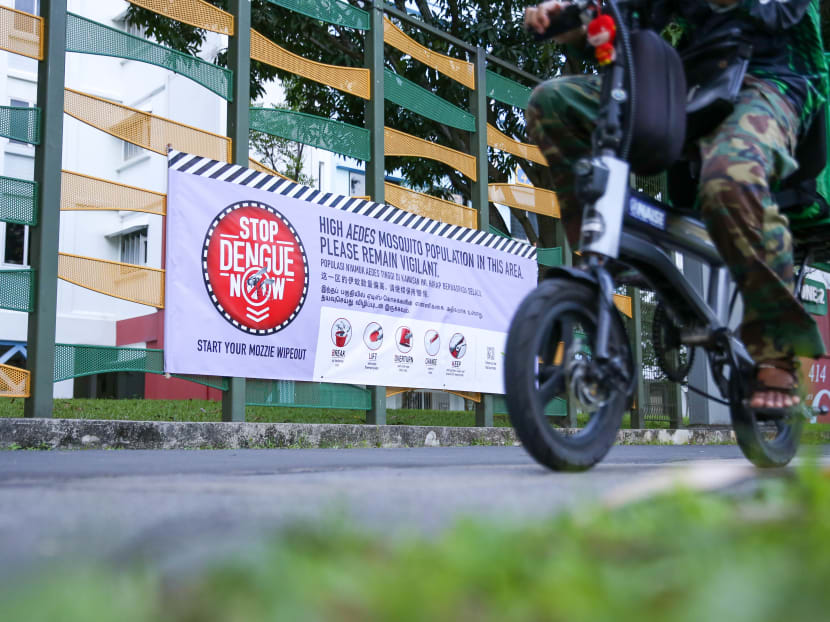More than 6,000 dengue cases reported in 2022 so far, exceeding total cases in 2021
SINGAPORE — More than 6000 dengue cases have been reported this year to date, exceeding the total 5,258 cases reported for the whole of 2021, the National Environment Agency (NEA) said on Thursday (April 28).

- More than 6000 dengue cases have been reported in 2022 to date
- This exceeds the total of 5,258 cases reported for the whole of 2021
- During recent inspections, NEA detected multiple mosquito breeding habitats at several places
- It will be taking strong enforcement action against these recent cases of egregious mosquito breeding, it said
SINGAPORE — More than 6,000 dengue cases have been reported this year to date, exceeding the total 5,258 cases reported for the whole of 2021, the National Environment Agency (NEA) said on Thursday (April 28).
There were 941 dengue cases reported last week alone — 208 cases more than in the previous week, the agency said in a press release.
This rise in weekly reported dengue cases has continued even before Singapore reaches the usual peak dengue season from June to October. Most of this mosquito breeding activity were found in homes, NEA added.
As of Tuesday, there were 193 active dengue clusters reported, with the top five largest dengue clusters found on Grove Avenue near Ghim Moh, Woodlands Avenue 9, Eng Kong Terrace in Upper Bukit Timah, Champions Way near Woodlands Avenue 1 and Borthwick Drive in the Serangoon Gardens area.
NEA noted that despite closing 394 of 587 of the dengue clusters notified since the start of this year, it still detected multiple mosquito breeding habitats at several premises during recent inspections.
A dengue cluster is formed when there are two or more cases within 14 days and located within 150m of each other. A cluster is closed when there are no more active transmissions detected.
“These egregious cases of mosquito breeding show that some premises owners and occupiers are still not carrying out necessary basic mosquito control checks, despite the current serious dengue situation in Singapore,” it said.
NEA added that it “will be taking strong enforcement action against these recent cases of egregious mosquito breeding”.
Its statement also named six extremely bad cases, one of which are the residential premises located within the Borthwick Drive dengue cluster.
In March and April this year, NEA officers who inspected the location found two ornamental containers and a basin with more than 50 mosquito larvae each, a water fountain with about 100 larvae, an unused fountain and an unused pond with more than a few hundred larvae each.
Thirteen other premises had mosquito breeding habitats with 100 or more larvae each.
During another inspection along Grove Avenue in March, NEA officers found a total of 100 mosquito larvae in domestic containers, a flowerpot plate, and an inspection chamber at a residential property.
NEA also found mosquito breeding in ground puddles of a condominium located at Hougang Avenue 5 and a car park within commercial premises located on Cheong Chin Nam Road in Upper Bukit Timah during inspections in April.
Each were found to have more than 100 mosquito larvae.
“For households found with repeat mosquito breeding offences and multiple mosquito breeding habitats, offenders may face a fine of up to S$5,000, or imprisonment for a term not exceeding three months, or both, for the first court conviction,” NEA said.
Repeat offenders will be given heftier penalties or sent to court.
In addition to ongoing islandwide dengue inspections, NEA said that it has intensified inspection and outreach efforts in April and will continue to do so over the next few months.
It urged all occupants of premises to remove any stagnant water in their immediate surroundings and destroy any mosquito breeding habitats found in order “to help break the cycle of dengue transmission as quickly as possible”.
“Residents living in dengue cluster areas are strongly urged to cooperate with NEA officers and facilitate their checks,” it added.
CLARIFICATION: An earlier version of this report said there were 5,258 dengue cases in 2020. NEA has clarified that this figure was for the year 2021 instead.








